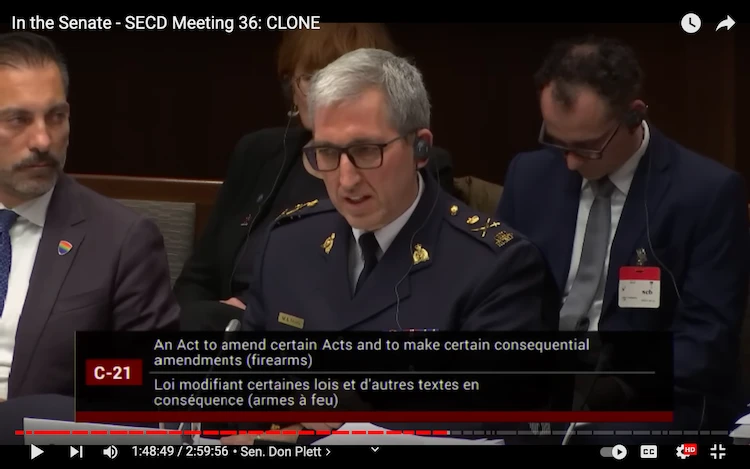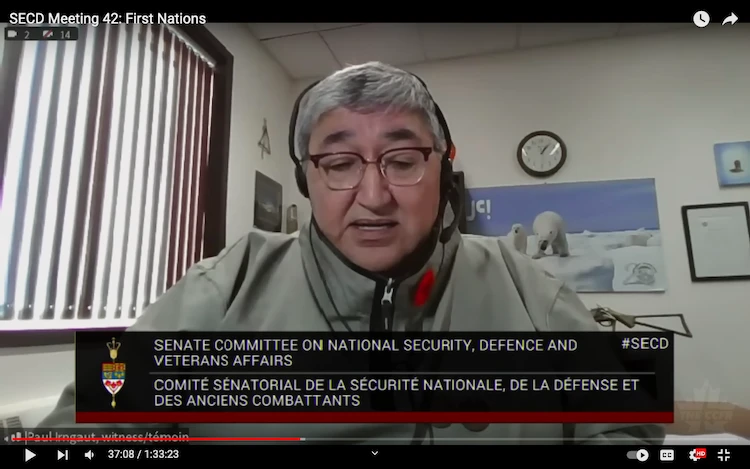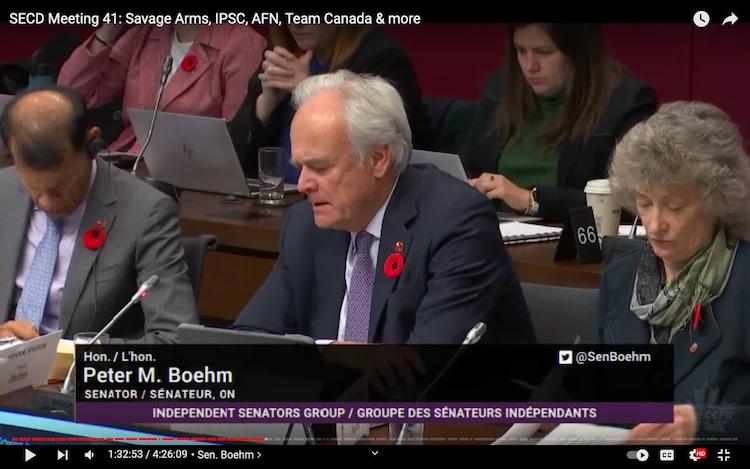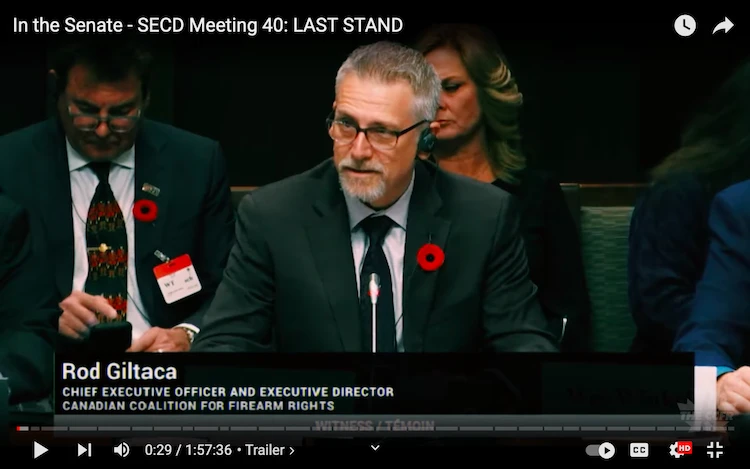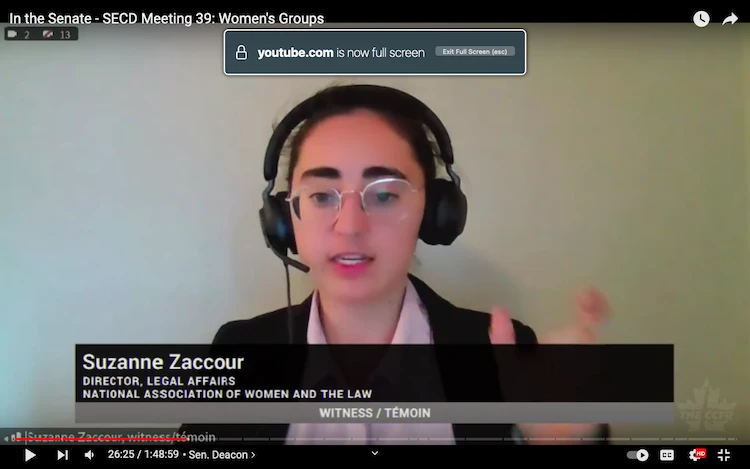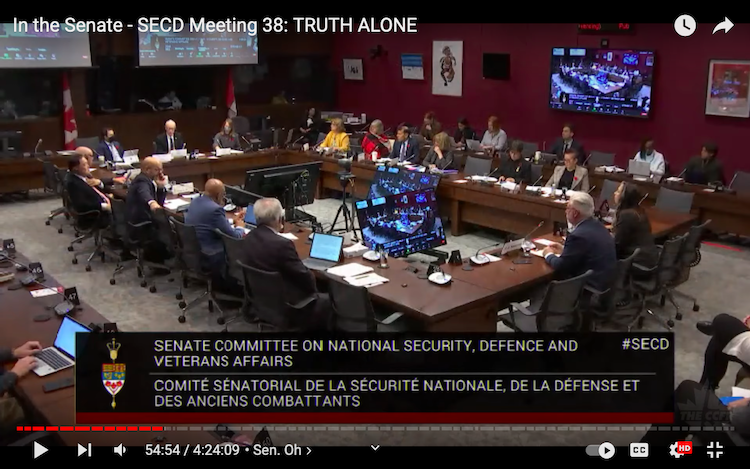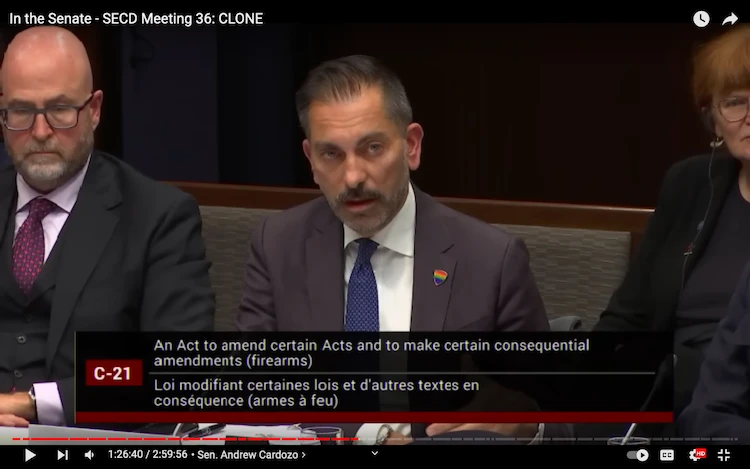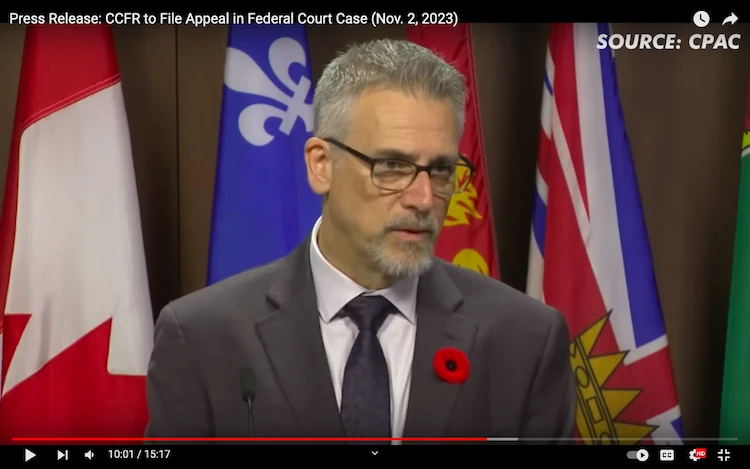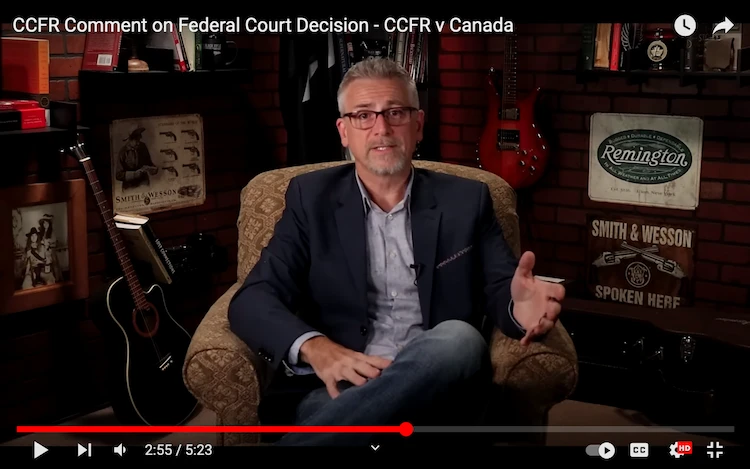Video: In the Senate – SECD Meeting: 36 CLONE
YouTube Link: https://youtu.be/lQ_FmFqsz1k?si=DxbT8lU7Pc18_l6j
Related Content:
- Infringes civil liberties and property rights of millions of lawful, responsible gun owners who comply with regulations.
- Disproportionately impacts rural communities by banning firearms relied on as vital tools.
- Lacked transparency and consultation with lawful gun owners, Indigenous groups and rural Canadians.
- Selectively omitted data and experts contradicting the bill’s agenda-driven narrative.
- Could permanently erode Canada’s cultural heritage and identity by dissolving activities embodying the ‘warrior ethos.’
- Penalizing lawful owners risks unintended public safety consequences while ignoring root causes of violence.
- Contradicts and disregards existing, demonstrably effective gun control measures already in place.
- No compelling evidence justifies prohibiting conventional hunting rifles as “military-style assault weapons.”
- The vague definition of “variants” grants excessive regulatory power without accountability.
- Warrantless search powers violate citizens’ privacy rights and due process.
- Ignores Canada’s obligation to honour Indigenous treaty rights to sustainably hunt.
- Reflects a dismissive attitude toward rural Canadians’ norms, values and lifestyles.
- Excluded lawful gun owners from consultation despite disproportionate impact.
- Erroneous firearm classifications could ban countless firearms safely used for decades.
- Grants unchecked authority to make sweeping regulatory changes without transparency.
- Increased criminalization risks unsafe illegal weapons procurement.
- Dismissed alternative evidence-based policy solutions in favour of a simplistic ban approach.
- Violates Charter rights to property, expression, due process and liberty.
- Punishes lawful owners for the actions of criminal gun users – inherently unjust.
- Fails to meaningfully invest in border security, mental health services, addiction support, community programs and fighting organized crime – all proven to effectively promote public safety.
- No impartial evidence links lawful gun ownership to increased public safety risks.
- Damages Canada’s reputation as a progressive, inclusive society respecting cultural diversity.
- Risks alienating lawful gun owners, undermining compliance and cooperation over distrust.
- Allows excessive discretion to ban firearms based on physical appearance instead of functionality.
- Sets a troubling precedent for overriding democratic processes, dismissing evidence, & eroding civil liberties.
- Poses risks to domestic security by reducing capabilities of lawful owners to serve as a counterbalance to centralized power.
- Could severely damage Canadian sports shooting which uplifts our athletes on the global stage.
- Fails to comprehend the cultural significance of hunting for Indigenous communities.
- Indicates a lack of adequate education on firearm safety, training and responsible ownership.
- Reflects a dismissive view of conservative thought, identities and principles.
- Overlooks the perspectives of European immigrants and the valued ‘warrior ethos’ in their cultural identities.
- Perpetuates false dichotomies surrounding gender by suppressing traditional notions of masculinity.
- Ignores the need for balance between administrative and warrior ruler philosophies throughout history.
- Could deprive Canadians of philosophical development and maturity cultivated through firearms training.
- Contributes to a society disconnected from history, principles of freedom, and civic responsibility.
- The bill conflicts with Section 2 of the Canadian Charter of Rights and Freedoms, which staunchly defends freedom of expression and every individual’s right to liberty and security.
- It stands in violation of Articles 18 and 19 of the Universal Declaration of Human Rights, which are pillars safeguarding the freedom of thought and opinion.
- Bill C-21 also infringes upon Articles 18 and 19 of the International Covenant on Civil and Political Rights, which emphasizes the sanctity of freedom of expression and opinion.
- From a cultural standpoint, its enactment would breach the UNESCO Convention for the Safeguarding of the Intangible Cultural Heritage, thereby undermining the preservation of cultural practices and traditions like “International Practical Shooting Confederation (IPSC)” shooting sports.
- Importantly, Indigenous treaty rights, especially those allowing sustainable hunting and provisioning for communities, would be unlawfully disregarded.
Related Content:
Video: SECD Meeting 42: First Nations
Video: SECD Meeting 41: Savage Arms, IPSC, AFN, Team Canada & more
Video: In the Senate – SECD Meeting 40: LAST STAND
Video: In the Senate – SECD Meeting 39: Women’s Groups
Video: In the Senate – SECD Meeting 38: TRUTH ALONE
Video: In the Senate – SECD MEETING 36: CLONE
Video: Press Release: CCFR to File Appeal in Federal Court Case (Nov. 2, 2023)
Video: CCFR Comment on Federal Court Decision – CCFR v Canada
Related books and resources:
“Gun Control in Canada: A History” by R. Blake Brown: This book provides a historical overview of gun control laws in Canada, which could help readers understand the background and context of current legislative changes. “The Canadian Regime: An Introduction to Parliamentary Government in Canada, Sixth Edition” by Patrick Malcolmson, Richard Myers, Gerald Baier, and Tom Bateman: This book offers insights into Canada’s parliamentary system, which is crucial for understanding how laws like Bill C-21 are proposed, debated, and enacted. “More Guns, Less Crime: Understanding Crime and Gun Control Laws” by John R. Lott Jr.: While focused on the American context, this book provides arguments and statistical analyses that could be pertinent to discussions around Bill C-21 and firearm legislation in general. “Shooting to Kill?: Policing, Firearms, and Armed Response” by Peter Squires and Peter Kennison: This book explores the relationship between firearms and law enforcement, offering insights relevant to discussions on public safety and firearms legislation. “Canadian Firearms Law and Policy” by James B. Stribopoulos and M. A. Ginn: This work provides a comprehensive overview of firearms law and policy in Canada, helping readers understand the legal landscape surrounding Bill C-21. “Democracy in Canada: The Disintegration of Our Institutions” by Donald J. Savoie: This book discusses the challenges facing Canadian democracy and institutions, offering a broader context for legislative changes and public discourse. “The Global Gun Epidemic: From Saturday Night Specials to AK-47s” by Wendy Cukier and Victor W. Sidel: Provides a global perspective on gun control issues, which can enrich the discussion on Canada’s legislation. “Rural Crime and Community Safety” by Vania Ceccato and Rania Rostami: This book discusses crime and safety in rural settings, relevant to the debate on firearms access for rural residents under new Canadian gun laws. “Policing and Society: A Global Approach” by Marc L. Steinberg: Offers insights into policing practices around the world, which can provide a comparative perspective to Canada’s approach to public safety and gun control. “Armed America: The Remarkable Story of How and Why Guns Became as American as Apple Pie” by Clayton E. Cramer: While focused on the U.S., this book provides a comparative backdrop that can enrich understanding of the “importation of American culture” argument in the Canadian context.
To see our Donate Page, click https://skillsgaptrainer.com/donate
To see our Instagram Channel, click https://www.instagram.com/skillsgaptrainer/
To see some of our Udemy Courses, click SGT Udemy Page
To see our YouTube Channel, click https://www.youtube.com/@skillsgaptrainer
